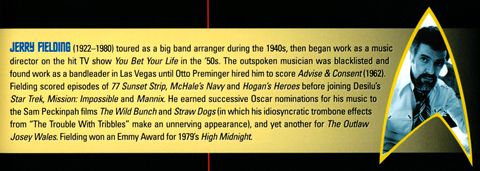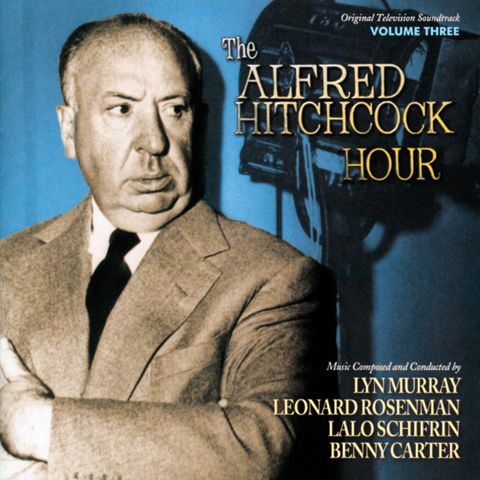 |
 |
| View Mode |
| Regular | Headlines |
 |
| All times are
PT (Pacific Time), U.S.A.
|
 |
|
 |
|
 |
 |
| My Vintage Selection for 2012, Part 2! |
| Posted By: Thomas Rucki on December 31, 2012 - 4:01 AM |
|
|

In this final part, we will thoroughly analyze the television music of one single decade: the not-so-Swinging Sixties.
|
|
|
|
SPECIFICATIONS: APART FROM ECONOMICAL FACTORS, THE CRITERIA ARE BASED ON THE FOLLOWING AXIOMS: THE RICHNESS OF THE ORIGINAL RECORDING, THE INTEGRITY OF THE INSTRUMENTAL MUSIC, THE LEVEL OF INNOVATION, THE PACE OF THE CORPUS, THE ELEMENT OF SURPRISE, THE COLOR OF THE INSTRUMENTS USE, THE CROSS-REFERENCES.
|
|
|
|
| vintage selection per decade |
|
|
All soundtracks are classified in the alphabetical order of the composers. LN means “Liner Notes” and they include authors dealing with cinema/tv and music analysis, track-by-track commentary, vintage LP notes, technical talk.
|
|
|
|
2. Television Music
|
|
|
|
1960's Soundtracks (2) |
|
Various Composers |
|
The Alfred Hitchcock Hour, Vol. 3 (Varèse Sarabande) (LN: Robert Townson, Jon Burlingame)
|
|
Various Composers |
|
Star Trek: The Original Series (La-La Land) (LN: Jeff Bond)
|
|
|
|
Notes
|
The Alfred Hitchcock Hour, Vol. 3 is a sampler of the other composers who contribute to the anthology and among them Herrmann’s friend Lyn Murray and also a band of modernists and jazzists. → Disc 1 is quite a delight and centered around one single composer. Lyn Murray manages to write various types of music: “Who Needs an Enemy?” (a piano and strings-oriented score with a light and bucolic tone that toys with various leanings—track #3 is damaged at 01:21), “Loney Place” (a sad score with strings, a discreet electric guitar that plays an ostinato at 01:38 and at 03:41, a brutal clarinet to conclude), “Triumph” (an Asian-oriented score that foreshadows Earl Hagen’s I Spy scores and that is percussions-laden combined with a duo of flutes and clarinets that lead the whole corpus; some passages almost anticipate his future Time Tunnel output) and “Thanatos Palace Hotel” (an intense dramatic score with a cinematic scope that includes a recurring hectic escape theme that appears from track #12 at 03:02). → Disc 2 is versatile by contrast and starts with the best score: “Beast in View” composed by Leonard Rosenman who delivers the usual fat atonal storm mixed with sneaky atmospheres done with a low register piano a la “And When The Sky was Opened”. Then Lalo Schifrin takesover by blending intimistic jazz, youth 50’s rock-and-roll (notice the cliché frantic saxophone cue that comes and goes) and minimalism for “Memo for Purgatory”: you can recognize the suspenseful use of flute and bongo. On the whole, the arrangements sound like his Man from UNCLE input and you can even spot a tiny segment foreshadowing a 1968 Mission: Impossible score entitled: “The Contender”—listen carefully to the track #6 cue that starts from 00:54 to 01:01. Benny Carter’s “The Crimson Witness” is an old-fashioned jazzy score that includes romance music and reminds the bent from Nelson Riddle’s The Untouchables. Rosenman’s exit score “One of the Family” is both childish and dreamlike with lowkey suspenseful moments.
•
Star Trek is a mixed bag of singular composers. I associate the sound of the series with three persons: Twilight Zone composer Fred Steiner, Gerald Fried, Sol Kaplan. Some of the composers also work on the last series produced by Desilu: Mission: Impossible (see Jerry Fielding, Gerald Fried) and Mannix (see George Duning, Jerry Fielding, Gerald Fried and Fred Steiner as well as music editor Robert Raff). The signatures of these particular music men are part of Desilu’s cult series. My personal favourite scores are by Jerry Fielding: “The Trouble with Tribbles” (whose action-packed track “Big Fite” is almost identical to the season 1 score “Make It Like It Never Happened” from Mannix and also features “the laughing trombones” from Advise & Consent that will come back in Straw Dogs, especially in the rape scene) and “Spectre of the Gun” (a proto-Wild Bunch score filled with snare drums, accordion and harmonica)—the episode in itself refers to Gunfight at O.K. Corral (1957 with DeForest Kelley), meaning a bloody showdown. For the record, you can find some Fielding goodies: see season 2 set, disc 5, track #58 ("No Tribble at All"), #59 ("Poor Jonesy", orchestra only), #60 ("Poor Jonesy", trombone sweetener at recorded speed) and #61 ("Tribble FX") which is an unused tribble sound effect executed by Samuel Matlovsky and season 3 set, disc 5, track #46 ("Final Curtain": 13 seconds). Jeff Bond’s work on the liner notes and score-by-score analysis is impressive—too bad, the official list of performers for Jerry Fielding’s “The Trouble With Tribbles” didn’t survive. To conclude quickly because I have received these soundtracks recently: the boxset is a true labor of love and the achievement appears outstanding.
→ Season 1 scores are best-represented by two artists: series composer Alexander Courage (disc 2: “The Man Trap”—with a use of electrified instruments: violin, cello and sax—and “The Naked Time”) and Fred Steiner (disc 3: “Charlie X” and “Mudd’s Women” but also the three remaining scores "The Carbomite Maneuver", "Balance of Terror", "What Are Little Girls Made Of?" which have the series’ arch-gravitas and threatening imperialistic flavor) which both give the most memorable materials.
→ Season 2 scores are best-represented by three artists: Gerald Fried (disc 1 & 2: “Catspaw”—it sounds like the season 2 score from Mission: Impossible entitled “Trek”—, “Friday’s Child”, the tribal “Amok Time”—which contains a rework of Igor Stravinsky’s “Ritual of the Ancestors” from The Rite of Spring) that has a knack for bass guitar, Sol Kaplan (disc 2: the totalitarian march music for “The Doomsday Machine”)—both have already left a single score in the previous season—and George Duning’s enchanting love scores (disc 4: “Metamorphosis” and “Return to Tomorrow”).
→ Season 3 scores are best-represented by two artists: Alexander Courage's low-key scores (the Rosenman-esque "The Enterprise Incident" and "Plato's Stepchildren" with a dissonant organ) and, above all, George Duning's poignant and semi-experimental love scores (disc 4: "Is There in Truth No Beauty?" and the dreamlike "The Empath"—which is almost identical in its leaning to the season 2 score "Edge of the Knife" from Mannix) which introduce the Yamaha E-3 organ. The library music of disc 5 conducted by Wilbur Hatch is particularly inspired.
|
|
|
|
|
|
|
|
|
|
|

|
 |
|
 |
 |
 |
 |
 |
 |
 |
Today in Film Score History:
April 16 |
 |
| Alex North begins recording his score for Cheyenne Autumn (1964) |
 |
| Basil Poledouris begins recording his score to Quigley Down Under (1990) |
 |
| Charles Chaplin born (1889) |
 |
| Chaz Jankel born (1952) |
 |
| David Raksin records his score for Pat and Mike (1952) |
 |
| Henry Mancini born (1924) |
 |
| Jay Chattaway records his score for the Star Trek: The Next Generation episode “Frame of Mind” (1993) |
 |
| Jerry Goldsmith begins recording his score for The Detective (1968) |
 |
| Perry Botkin Jr. born (1933) |
 |
| Warren Barker born (1923) |
 |
 |
|
|
 |
|

















